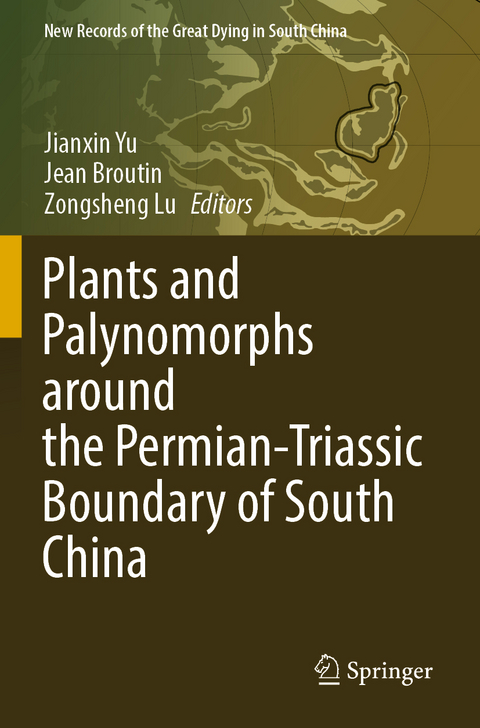
Plants and Palynomorphs around the Permian-Triassic Boundary of South China
Springer Verlag, Singapore
978-981-19-1494-2 (ISBN)
This book documents timely and systematically marvelous fossils (plants and sporopollen) related to the biggest mass extinction of the Permian–Triassic transition. Numerous beautiful pictures and comprehensive records on the plants of this unique and critical interval of geohistory are presented in this book. It greatly contributes to understanding of the Permian–Triassic plant diversity and evolution. For geologists, it is important to understand the Permian–Triassic crisis, and for students, it is attractive to learn about the plants’ response to palaeoclimatic changes.
Professor Jianxin Yu works at the State Key Laboratory of Biogeology and Environmental Geology and School of Earth Sciences, China University of Geosciences, Wuhan, China. Her research interests involve the Permian–Triassic plants and palynomorphs, Mesozoic to Cenozoic palynomorphs and paleoclimatic evolution. She obtained her Ph.D. degrees at University Paris VI (Université Pierre et Marie Curie) and China University of Geosciences and has also worked at University Paris VI (Université Pierre et Marie Curie) as a visiting researcher. She has served as the chief scientist of several NSFC projects and has published more than 50 peer-reviewed scientific papers, covering Global and Planetary change, Earth Science Review, as well as Review of Paleobotany and Palynology. Professor Jean Broutin works at History of the Earth (National Museum of natural History) and University Pierre & Marie Curie, where he was the head of the research team “Paleobotany and Paleoecology”. His research interests involve the late Paleozoic and Mesozoic plants, palynomorphs, taphonomy and paleoclimate. He has served as the chief scientist of several CNRS projects and other international competitive research grants. He has published more than 190 peer-reviewed scientific papers, covering Earth Science Review, Review of Paleobotany and Palynology, Journal of Asian Earth Sciences, as well as Palaeogeography, Palaeoclimatology and Palaeoecology. Professor Zongsheng Lu works at the State Key Laboratory of Biogeology and Environmental Geology and School of Earth Sciences, China University of Geosciences, Wuhan, China. His research interests include the Triassic–Jurassic plants, trace fossils and sedimentary. He worked at Queensland University as a visiting scholar. He has served as the chief scientist of several NSFC projects and has published more than 45 peer-reviewed scientific papers.
Chapter 1 Literature Review.- Chapter 2 Stratigraphy of the studied sections.- Chapter 3 Materials and methods.- Chapter 4 Late Permian Changhsingian flora in varied palaeogeographic settings in South China .- Chapter 5 Early Triassic Induan flora in varied palaeogeographic settings in South China.- Chapter 6 Palynology across the Permian-Triassic Boundary in South China.- Chapter 7 Extinction Pattern and recovery of the Permian-Triassic Flora in South China.- Chapter 8 Plant and environment co-evolution in Permian-Triassic Transition.- Chapter 9 Systematic Palaeontology.- Chapter 10 Plant Fossils.- Chapter 11 Megaspores.- Chapter 12 Spore and Pollen Fossils.
| Erscheinungsdatum | 02.09.2023 |
|---|---|
| Reihe/Serie | New Records of the Great Dying in South China |
| Zusatzinfo | 38 Illustrations, color; 25 Illustrations, black and white; XIV, 254 p. 63 illus., 38 illus. in color. |
| Verlagsort | Singapore |
| Sprache | englisch |
| Maße | 155 x 235 mm |
| Themenwelt | Naturwissenschaften ► Biologie ► Botanik |
| Naturwissenschaften ► Biologie ► Evolution | |
| Naturwissenschaften ► Geowissenschaften ► Mineralogie / Paläontologie | |
| Schlagworte | Climate Change Adaptation Plants • Evolution of Plants in South China • Permian-Triassic Fossils • Permian-Triassic Mass Extinction • Taxonomy of Palynomorphs |
| ISBN-10 | 981-19-1494-X / 981191494X |
| ISBN-13 | 978-981-19-1494-2 / 9789811914942 |
| Zustand | Neuware |
| Informationen gemäß Produktsicherheitsverordnung (GPSR) | |
| Haben Sie eine Frage zum Produkt? |
aus dem Bereich


